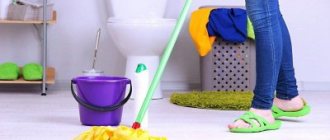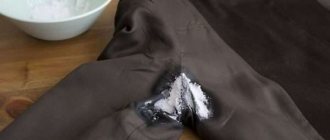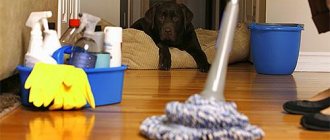The fast pace of modern life often leads to chaos not only in our daily routine, but also in our work, affairs and, of course, homes. Due to lack of time, energy, lack of concentration and disorganization, people are faced with systematic chaos in their lives. But, as the famous proverb says, clean is not where they clean, but where they don’t litter. This includes a careful selection of things, interior items and decor. Make a rating of books so that there are no unnecessary ones purchased “for show.” And then we move on to order.
To get rid of chaos you need to start with your own home. If you accustom yourself to cleanliness gradually, the discipline of order will fit tightly into the rhythm of life, and over time everything will become immaculately tidy everywhere and in everything.
However, keeping an apartment or house clean every day is not as easy as it seems at first glance. The housewife must follow some rules and also know the secrets of successful, fast and high-quality cleaning.
Today, many video instructions have been published on the Internet, telling about simple ways to keep your nest perfectly clean. The best recommendations and tips are selected in our article with photos.
Why people don't practice hygiene
To know how to approach a slob (or yourself, if you want to improve), it helps to first understand the reason for his or her behavior. The retraining strategy will depend to some extent on this.
Lack of habit
A person was simply not taught in childhood. They didn’t tell him how to clean up after himself, didn’t remind him if he didn’t brush his teeth, and so on. There are no special psychological motives or hidden reasons, it’s just a lack of everyday skill. Probably, the parents of such a child are not particularly clean themselves. Now that this child has grown up, he behaves as he used to. For him, dirty hair or a moldy plate under the bed is the norm. And even if he understands that something is going wrong, he does not have a formed habit, so any “hygienic” action has to be done consciously, making volitional efforts.
Learned pathological behavior pattern
This reason also comes from childhood. The child was told so often that he was crooked, sloppy or a pig that he believed it. As a result, now he does nothing because he does not see the need or knows in advance that he cannot cope. “Well, I’m a slob, and slobs don’t clean up after themselves, so why should I try?”
Another reason is the formed negative attitude towards work and personal hygiene. If they tried to teach a child to order and cleanliness using harsh and authoritarian methods, then in adulthood he may simply rebel. To some extent, the approach “to spite my grandmother I’ll frostbite my ears” is explained by the emotional immaturity and some immaturity of the person.
Depression, anxiety disorders, other illnesses
Depression, anemia, hypothyroidism and some other diseases are often accompanied by loss of strength, weakness, dizziness, and fatigue. As a result, a person is simply physically unable or does not see the point in taking care of himself and keeping the house in order.
You can also distinguish Plyushkin syndrome, or pathological hoarding. [1] This is an obsessive behavior disorder in which a person begins to collect unnecessary things, turning the house into a kind of warehouse. As a result, there is simply nowhere to wash dishes or take a shower. But this syndrome is quite difficult to miss. If your loved one simply does not clean up after himself, but does not fill the apartment with things from floor to ceiling, then this is definitely not about him.
Lack of own territory or things
Sometimes sloppiness is caused by the fact that a person does not feel this place is his home or his territory. For him, this is, for example, an apartment for a husband/wife, parents, rented, temporary. And since this is someone else’s, there is no point or desire to invest or adapt to someone else’s rules.
It just seems to you
Let's develop personal hygiene skills
BUY ] WATCH VIDEO ABOUT THE SERVICE[/anchor]
What appears to be sloppiness to other people may actually be a variant of the norm. For example, someone washes their hair every day, while for others the norm is once every 2-3 days. Some people think that their hands must be manicured, while others are happy with just clean nails.
“I constantly quarrel with my mother-in-law. More precisely, she is with me, and I am more silent. In her opinion, we are terrible slobs and dirty. I change my bed linen only once a week, I don’t starch my husband’s shirt collars and, horror of horrors, I don’t immediately change my child’s clothes if he gets dirty on a walk. I'm serious now. In her opinion, if my little one fell and got dirty, then we urgently need to run home and change clothes. And only then can you go for a walk again. We have somehow become accustomed to her outbursts. Well, we have different concepts of cleanliness, different. And I don’t plan to change mine, I don’t want to become a hygiene maniac.”
— Anna, 24 years old
These 5 reasons are common to all people, but there are some features that are characteristic only of certain groups.
Order in the hallway
Entering the house, the first emotions are formed from the situation in the apartment. Will it be a pleasant rest after a hard day, or will the chaos and clutter make you despondent? Try to follow the tips below to always feel positive about your upcoming vacation when returning home from work or a walk.
Find a place for small items
Things like keys or a shoe brush need a specific place. You can buy a basket for such little things. The things you need in the hallway will always be visible and in a structured order. Special convenient hooks or boxes are sold for keys, and shoe cleaning tools can be placed in a basket.
Put hats and gloves in the chest of drawers
After returning home, try to immediately hang your coat in the closet, and put your gloves and hats in their place, and not leave them on open surfaces - on the chest of drawers or near the mirror. It is best if a separate place is allocated for hats and accessories. Put things back in their place right away; it won’t take much time, but it will save you energy while getting ready in the morning.
Store shoes in a shoe rack or on a shelf
For sneakers, sneakers and boots you need space in a shoe rack or on a shelf. If this is not possible, you should set aside space for shoes in the closet. It is important to immediately put your boots, sneakers, shoes, and sneakers back in their place after returning home. This way they won’t spoil the look of the room.
Female sloppiness
Excessive demands create the feeling that a girl or woman does not follow the rules of personal hygiene. In this regard, women are often required to do more than men. You need to not only have clean and combed hair, but also style it in a complex hairstyle. Not only wash your face and brush your teeth, but also use decorative cosmetics. Some women do not feel the need for such care procedures and deliberately refuse them. And this does not mean that the girl is a slob or dirty. The main thing is cleanliness and the absence of an unpleasant odor. The rest is a matter of taste.
Male sloppiness
Uncleanliness in a man may be based on the belief that “a man should be a little prettier than a monkey” or “smelly, powerful, mustachioed and hairy.” Some men believe that they can be unkempt and smell bad - they are men and should be brutal. Well, washing their things is a woman’s responsibility. If a woman hasn’t washed it, then you can walk around in dirty clothes and make excuses: “Well, it’s not my fault that my wife is dirty and didn’t wash my T-shirt. Because of her, I had to put on dirty clothes.”
Why do you need to take care of personal hygiene?
This is necessary not only so that people will be drawn to you (it is difficult to be drawn to a person who smells unpleasant and looks repulsive). Lack of personal hygiene has a negative impact on health and can cause the development of certain diseases. For example, intestinal infections and ARVI (rare hand washing), caries and periodontal disease (rare brushing of teeth), cystitis, urethritis, balanitis (insufficient intimate hygiene).
At the same time, the personal hygiene of a person, man or woman, includes not only keeping the body clean (teeth, nails, hair, skin), but also clothes, shoes, and one’s home. It also prevents the development of various diseases. For example, a large amount of dust can trigger the development of allergies or asthma. Therefore, maintaining personal hygiene is a natural and important part of a healthy lifestyle. [2]
Cleaning schedule
Experts advise dividing things by season. Make a schedule of what needs to be done quarterly, what every month, what every week, and what daily. Once every three to four months we wash curtains and drapes, wash chandeliers and windows, disassemble cabinets and sort through things, get rid of unnecessary things, wash ceilings and baseboards. To provide an incentive, such cleaning can be timed to coincide with a holiday or date, for example, New Year, Easter, and so on.
A little less often, once every five to six months, it is recommended to clean pillows, blankets and mattresses, wash the oven and beat out carpets. Don’t forget to wash hard-to-reach places behind the refrigerator, cabinet, stove, and so on. Divide tasks into several days and complete them throughout the week.
The list of tasks that need to be done every month includes washing doors and tiled walls, refrigerator and microwave oven, kitchen unit and hood. This also includes careful processing of pots, pans and other kitchen utensils. We also clean rugs in the hallway, bathroom and toilet. But, if animals live in the house, it is recommended to clean it every week.
Every week I wash mirrors and bathroom fixtures, the door of the refrigerator and microwave oven, and the hatch of the washing machine. We thoroughly wash the floors, including under and behind the furniture. Twice a week we lightly mop the floors and vacuum the carpets. If there are children and animals, we do this every other day.
Every day we devote 15-20 minutes to cleaning. Here we wash the dishes and put things in the closet or send them to the laundry, ventilate the apartment and sweep, wash the kitchen table, sink and work surface in the kitchen. Once every two or three days, we wash the shower or bathtub and wipe the dust in the house. This schedule will help maintain perfect cleanliness in the kitchen, bathrooms and rooms.
How to get rid of sloppiness and untidiness
“I’m ashamed to admit, but I’m a slob and a lazy person. No, I can be neat and maintain order when other people are around. But as soon as I'm left alone, I forget about everything. I’ll be home sick for a week and won’t brush my teeth even once. Unless the doctor arrives. When my husband is on a business trip, I litter the apartment and may not take a shower for 2-3 days. How to get rid of sloppiness and learn to take care of yourself for your own sake?
— Tamara, 27 years old
1st step. If a slob is your loved one
If you want to become more tidy yourself, you can move on to the second stage. If a dirty and slob is a husband or wife, then first it is important to convey to him the need for such changes. This is not always possible - there are particularly stubborn individuals who consider hygiene an unworthy and indecent activity. In other cases, you can try. To make the conversation seem like an attempt to negotiate, and not an attack, try following these rules:
- Choose a good time to talk. You should not start when you are both tired, irritated, hungry or sleepy.
- Frame your complaint as a request, not as a reproach.
- Avoid generalizations like “never” and “always.” It is unlikely that the phrase “you never brush your teeth in the morning” will be true.
- Use “I messages” (I wish I did, I think I feel this way).
- Start with the main thing, speak directly, not in hints. Clearly formulate the result you want to get.
- Remember that you are allies, not adversaries. You are a family and work together, not against each other.
For example, a request might look like this: “You know that I am very sensitive to smells. Sometimes, when you don't have time to take a shower, you start to smell not very nice. Of course, I love you anyway, but I would like you to smell nice. This makes me want to hug you more often.”
You may need more than one conversation and patience. But if your partner is willing to negotiate, sooner or later you will achieve success.
2nd step. Rule out diseases
As we said, some diseases can cause a loss of strength and a reluctance to take care of oneself. People who suffer from such diseases often do not admit it even to themselves. But until a person cures, for example, depression, all attempts to learn new habits and become neater will fail.
3rd step. Set yourself up for action, not regret.
Focus on actions rather than emotions or reasons for your inability. Guilt and shame are bad helpers. They will hinder you more than help you. Therefore, first of all, learn to be calm about the fact that you do not yet know how to be neat. The key word is yet. You don’t know how yet, but you can learn. It is better to focus on actions - such tactics are more effective than constantly regretting what was not done. [3]
4th step. Identify the skills you need
What exactly do you need to consider yourself clean? For example, brush your teeth twice every day, change your socks every day, and wash the dishes immediately after eating. Remember that personal hygiene standards can vary greatly from person to person, so consider your requirements carefully. Is this really a necessity? Or are you striving for this under the pressure of society and stereotypes? The basis can be taken as cleanliness and the absence of an unpleasant odor. For example:
- hair should be clean and combed, but its length is my choice;
- nails should be neatly trimmed and free of dirt, everything else is my choice;
- the body should be clean, but the physique has nothing to do with neatness;
- My breath should smell good, my teeth should be brushed, but I don't have to flash a Hollywood smile.
“Since childhood, I have been drawn to some unattainable heights. Mom proudly told how grandfather forced them to sweep their dirt path. Moreover, it was necessary to sweep so that grains of sand could not be felt with your bare feet. We already lived in an apartment, we didn’t have an earthen path, but the bar was raised to unattainable heights. I was never neat and clean enough. And until I was 30, I tried to follow my mother’s instructions. And then I realized that it wasn’t me who needed it. I feel good even if there is a jacket hanging on the back of the chair. It's okay for me if hairs come out of my hair. And if children play with paint directly with their hands, that makes me feel good too. It took me a long time to learn not to blame myself for not having perfect order, but now I feel like I’m breathing freely. And it didn’t become covered in dirt, as my mother prophesied for me.”
— Svetlana, 37 years old
5th step. Organize your space
Make sure you have everything in place to follow your new habits. Are there pastes, brushes, shampoos, washcloths and shower gels? Do you like them? Is there a basket for dirty laundry? Convenient brushes and rags, detergents for cleaning the house? Is it easy to hang clean clothes in the closet? Even little things like bad tasting toothpaste or a dirty bathroom can hinder your progress.
6th step. Prepare for downturns
In the process of learning personal hygiene skills, there may be setbacks and failures - this point is also worth taking into account. [4] Don’t reproach or scold yourself; temporary setbacks are natural. Don’t assume that if it doesn’t work out the first time, then you don’t even have to try. When you were learning to walk, you tried many times, fell, but kept trying. You should treat mastering any skill or ability in the same way. And it’s better not to take on more than 2-3 simple skills at once, or more than 1 if the skill is complex.
7th step. Add a little game
If following your plan is difficult, try incorporating an element of play. We respond very well to numerical display of progress - use it. For example, mark the days of new socks on the calendar, throw 1 coin into the jar for each brushing of your teeth, and so on. Choose something that will stimulate you. Promise yourself a reward for completing a goal, for example, buy yourself a new dress or a new monitor if more than 25 days are filled in on the calendar.
What detergents should be
In order for the cleanliness of the house to please the owners for a long time, it is necessary to clean properly. And to properly restore order, you need to select suitable detergents and cleaning agents. Listed below are the most popular and necessary room cleaning products.
So, home remedies are available for the following purposes:
- Bathroom (for cleaning pipes, tiles, acrylic and ceramic surfaces), also sprays for mirrors and glass.
- Wet cleaning (floor detergents, for example, “Mr. Proper”, and cleaning powders for carpets. “Vanish” or “Kärcher” are suitable. For dust - “Pronto” polish).
- Sif cream works well for stains on the kitchen surface, and Fairy liquid cleaner works well for greasy dishes.
- Spray "Unicum", or similar ones, will help in cleaning and cleaning upholstered furniture.
- Liquid "Rhythmix" will cope with stains and dust on a TV or computer. Aerosol cans with the product are popular among housewives.
If you are allergic or generally do not use store-bought chemicals, you can easily prepare them yourself at home.
A universal solution for many types of stains, dirt, as well as dust and germs, is made from ordinary laundry soap and soda. Dissolve 50 g of baking soda in 100 ml of hot water. Grate 25 g of soap and add to the mixture. Stir until a light foam forms and the components are completely dissolved. Use a sponge or microfiber cloth to remove dirt or dust.











